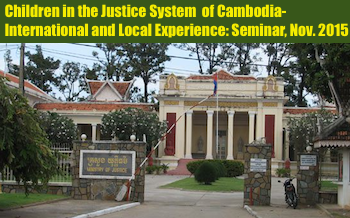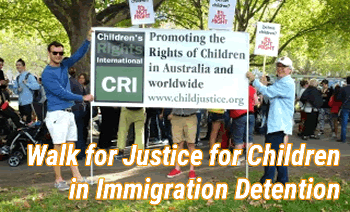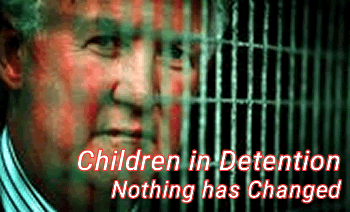Address by the Honourable Alastair Nicholson AO RFD QC
Chair Children’s Rights International
Australian Human Rights Commission, Sydney, NSW, 10 June 2016
Acknowledgments: Gadigal people of the Eora Nation; Megan Mitchell, National Children’s Commissioner; Tara Broughan, UNICEF Australia and Ahram Choi, NCYLC, Co-Chairs of the Australian Children’s Rights Task Force
This report by the Australian Child Rights taskforce convened by UNICEF Australia and the NYCYLC on the progress of the UN Convention on the Rights of the Child (CRC) in the 25 years since Australia ratified the Convention, while indicating a number of areas of progress in this area, also highlights serious deficiencies in our national performance.
It is thus an important document, providing a much needed measure of where we stand written from an independent point of view. I commented in my opening remarks published in the report that it makes uncomfortable reading for Australians, as did the 2012 report by the UN Committee on the Rights of the Child about Australia’s performance.
That report expressed concern at:
‘The absence of a comprehensive National Plan of Action…a comprehensive strategy, in consultation with children and civil society, for the overall realisation of principles and provisions of the Convention …. which can provide a framework for states and territories to adopt similar plans and strategies’.
As this report points out, in line with the UN recommendation, while there has been progress in a number of areas there is a lack of proper planning, particularly to address the problems of children most in need.
It points to the fact that certain groups of children and young people consistently face barriers to enjoying their rights and reaching their full potential including Aboriginal and Torres Strait Islander children, children who are seeking asylum or have refugee status, children from culturally and linguistically diverse backgrounds, children with disability, LGBTI children, homeless children and children from rural areas.
At present there is no Federal Minister with direct responsibility for children or youth. It thus does not engage in even a veiled pretence to include the voices of children and youth in decisions that affect them, which has become particularly clear in the defunding of dedicated children and youth organisations and peak bodies. It is true that we now have a distinguished Commissioner for Children but the issues facing Australian children are vast and cannot hope to be dealt with by one person with a limited staff.
I therefore commend the report’s conclusion that what is needed the to assign a Commonwealth Ministry with lead responsibility for policy regarding children and young people and the development of a National Plan for all children in Australia for the overall realisation and implementation of CRC. I also consider that such a Ministry should be led by a Minister with no other responsibility, so that he/she could devote their entire attention to children’s issues.
This is surely not an unreasonable approach given Australia’s historic role in the negotiation of CRC and its solemn ratification of it and the importance of children in our society.
Perhaps a properly motivated Government might also consider developing a priority list of issues raised by reports like this one, setting out clear accountabilities as to responsible Departments in relation to such issues alongside or as part of a National Plan.
One would hope that the report of an Australian group such as this, convened by highly respected Australian NGO’s will not be easily vilified, brushed off and ignored.
Sadly, the typical Australian political response to UN and other criticisms is to brush them off and/or attack the members of the Committee that made them.
I was reflecting when preparing these remarks on the election campaign to date and the failure of either of the major parties to take up issues relating to disadvantaged children. It seems that it is OK for politicians to pay lip service to the importance of children and young people, while at the same time doing little or nothing to address their needs.
These considerations give little cause for confidence that any Australian Government will pay heed to the report’s recommendations which are clearly sound. I hope that I am not being unduly pessimistic about this and it may even be that the Report’s release in the middle of the election campaign may provide some impetus for action.
While I agree with the Report’s recommendations as to a National Plan and specific setting up of a Minister and Ministry for Children, I do not believe that this goes far enough. I think that specific legislation is also required and I believe that the only way in which proper recognition can be given to CRC is for the Commonwealth to pass legislation incorporating it into Australian law. It clearly has the constitutional power to do so and if it is serious about advancing the interests of Australian children it would do so.
I believe that this is the only way for example that we can ever address issues like the appalling number of Aboriginal and Torres Strait Islander children held in detention, child poverty and inequality of opportunity, abuses of the child protection system and the many other issues where the Commonwealth and the States and Territories are either contravening the CRC or lagging behind in implementing it.
I now turn to some of the specific issues raised by the report about which everyone in this country and particularly its political leaders, should be deeply ashamed.
The first is our treatment of Aboriginal and Torres Strait Islander children. I have already mentioned the disgraceful detention rates of these children. Draconic changes to bail laws in criminal justice systems throughout Australia have led to many more children being unnecessarily incarcerated. Similarly, two strikes type laws in WA and NT have exacerbated the problem, particularly for Aboriginal children.
As recently as May 2016 the NT legislature introduced an amendment to the Bail Act introducing a presumption against bail to extend to persons that are arrested and have been previously convicted of two or more serious property crimes within the past two years. As Frank Brennan pointed out in a recent article, this was introduced against a background where figures show that in 2103 the national imprisonment rate was 170 prisoners per 100,000 of population and for the NT 821 per 100,000 of which 86% were Aboriginal and Torres Strait Islanders.
It is little wonder, as Brennan points out, that Patrick Dodson in a recent address to the National Press Club said:
“For the vast bulk of Aboriginal people the legal system is not a trusted instrument of justice; it is a feared and despised processing plant that propels the most vulnerable and disabled of our people to a broken and bleak future.”
The area of child protection also severely affects Aboriginal and Torres Strait Islander children who are heavily over represented in out of home care and where siblings are often separated in such circumstances.
Of course the separation of siblings, which is common throughout the system is damaging to all children and should not happen unless it is completely unavoidable.
Allied with this and applying to all children is that recent changes to some State child protection systems have further exacerbated the difficulties of children and Aboriginal and Torres Strait Islander children in particular by imposing restrictive time periods for the making of final dispositions as to where and with whom the child is to live, not uncommonly made by bureaucrats.
The report makes a number of constructive suggestions to address these problems including, importantly, giving children and young people a much greater role in the decision making process.
The next area is the criminal justice system generally, insofar as it affects children.
The Report urges that all legislation in each State and Territory and the Commonwealth should provide that detention should occur as a last resort for any person up to and including the age of 17.
There is a very uneven approach to this issue across the States and Territories. Queensland for example treats 17 year olds as adults for the purpose of the criminal justice system in direct contravention of CRC. Detention rates are very high in WA and NT whereas they are very low in Victoria, SA and the ACT and paradoxically for those who support a punishment approach, the rate of re-offending is much lower.
The report also correctly criticises the reduced availability of legal aid to children as was also noted by the Productivity Commission in 2014 and suggests increased funding to Community Legal Centres and other relevant organisations for this purpose.
Similarly, all States and Territories are in breach of CRC in relation to the age of criminal responsibility in that children are presumed to be capable of committing crimes from the age of ten whereas CRC prescribes fourteen. Why we retain such a punishment mentality directed towards young children is extremely puzzling.
I now turn to what I regard as the current most significant blight on Australia’s international reputation, that being our treatment of asylum seekers and particularly children.
The report quotes from one of many similar reports, this time from the UN Special Rapporteur on Torture 2015 as follows:
“….. by failing to provide adequate detention conditions; end the practice of detention of children; and put a stop to the escalating violence and tension at the Regional Processing Centre, [Australia] has violated the right of the asylum seekers, including children, to be free from torture or cruel, inhuman or degrading treatment.
I had never expected my country to be criticised for creating circumstances which have been described by senior UN officials as torture. there is no doubt that this is what we have done and are doing. We seem to have lost all empathy for people, including children, in distress.
We have forgotten that apart from our First Peoples we are a nation of immigrants and that many of our forebears came here seeking asylum.
I believe that much of the problem stems from a failure of leadership in this country which has led its leaders to adopt practices and processes that have been previously unheard of in a civilised society, for the purpose of short term political gain.
The responsibility must be shared between all political actors and successive governments over the course of decades.
It has always been a bipartisan policy, except for brief and unsuccessful efforts to seek other solutions and in many ways it has turned this country into an international pariah.
I hope our leaders felt proud when the right wing Government of Austria announced that it was adopting a similar policy last week. What an example for Australia to offer to the world!
For a contrast in leadership consider Angela Merkel’s approach in Germany, who is attempting to find durable solutions for refugee children and their families.
We have never faced the problems presently being faced in Europe and even at its highest, all asylum seekers who have come here could easily have been absorbed into our community. We in fact accept 200,000 people as immigrants each year, but only about 12,750 on humanitarian grounds as refugees. If we had accepted 50,000 we would have had a much better chance of entering into co-operative arrangements with other countries in the region and UNHCR and I suggest that the present problems would never have arisen.
Instead successive governments have relied on holding asylum seekers as hostages in remote, grossly under-resourced and developing client States such as Nauru and PNG as a means of “Stopping the boats”.
Endless crocodile tears have been wept by Ministers about the loss of life at sea and how they have prevented this, which must be the ultimate in cynical hypocrisy. Their aim has not been to save lives but to use existing asylum seekers as hostages to persuade potential asylum seekers to go somewhere else, whether they die there or not.
The Migration Act has been successively amended to enable the successful pursuit of this policy of refined cruelty with no regard for the people involved or the fact that our actions are in gross breach of numerous Conventions and international law generally.
The problem is ongoing. Even when there appears to be some softening of Government attitudes there is always a catch.
For example, the M68 cohort of children (and others brought back here post Dec 2014) remain ineligible to apply for Australian visas as they are still classified as ‘transitory persons’ (per s 5 of the Migration Act). This means they and their families remain eligible to return to Nauru at any time and are unable to get on with building a life here (or at least have their claims processed).
Similarly, the babies the subject of the (Baby Ferouz case) are still in limbo too – while they are able to at least apply for a visa, but 18 months on, none of those 113 children and their families are yet to be processed. Currently around 28,000 people in Australia (including children) are still waiting on processing – the ‘Legacy Caseload.’
One of the most troublesome features about our policy is the secrecy that surrounds it, now protected by law to the point where whistle-blowers including treating doctors, are likely to be prosecuted and imprisoned. Nauru has been a compliant participant in this exercise making it virtually impossible for journalists to enter Nauru. In both Nauru and Manus there have been avoidable deaths of asylum seekers and many have been subject to sexual and other assaults. The reason for the secrecy is obvious – there is a lot to hide.
Accompanying this has been the setting up of a black uniformed Australian Border Force whose activities are also surrounded with secrecy. Indeed it is almost impossible to contact a human being within the department by telephone to enquire about visa applications.
I do not like to be ashamed of my country as I am. There has been a monumental failure of leadership in relation to human rights and this has been accepted as the norm. Without courage, curiosity and principled leadership from our future leaders, our future appears bleak.
I do however remain heartened that we still have people like, Gillian Triggs, Julian Burnside, Frank Brennan, Megan Mitchell and many other equally dedicated people in the NGO’s, including you who have come today, there is still hope that Australia can return to its rightful place as a humanitarian and decent country. I welcome the launch of the CRC25 Report and hope that this may be a small step towards Australia to be facing in the right direction.













